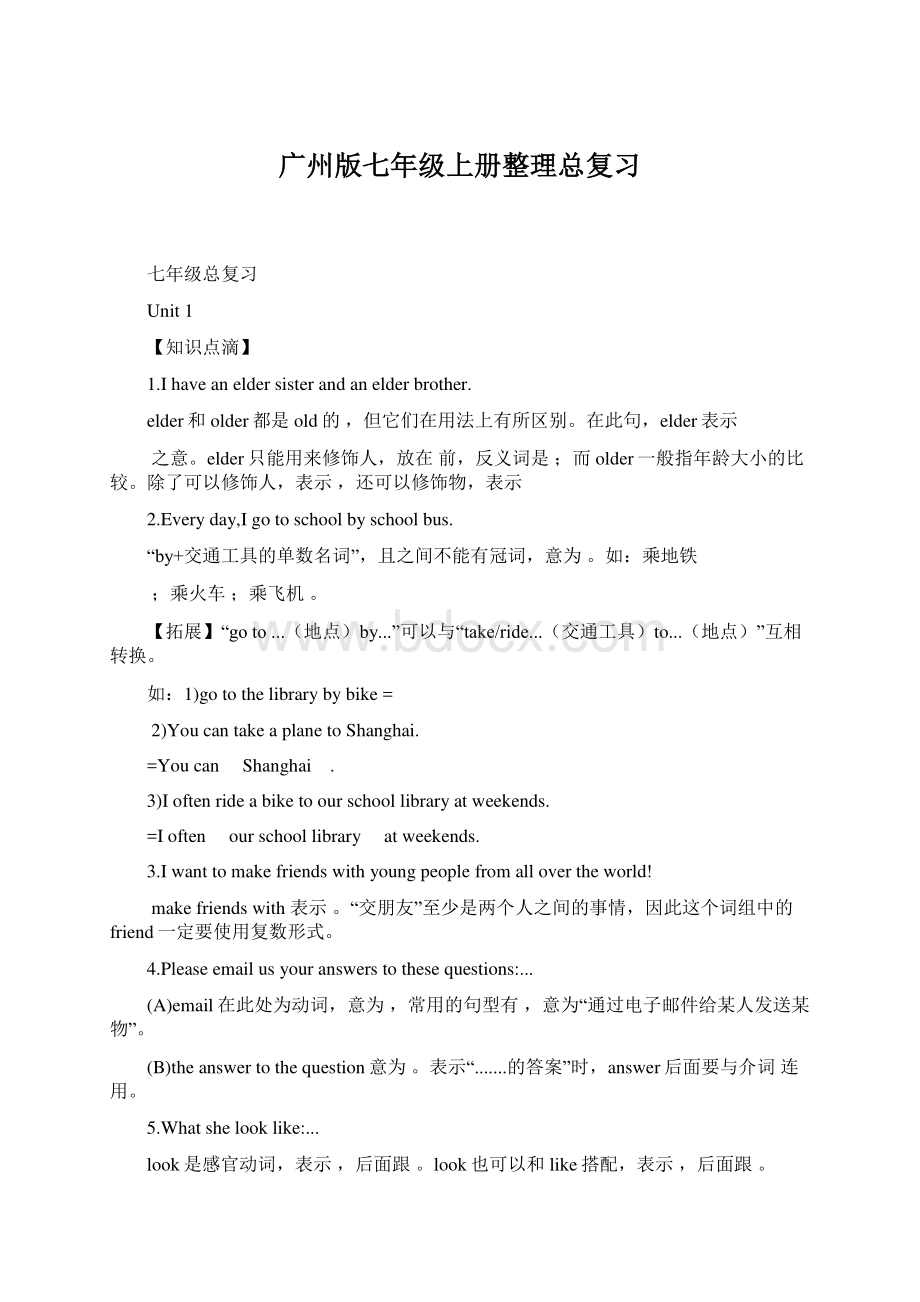广州版七年级上册整理总复习.docx
《广州版七年级上册整理总复习.docx》由会员分享,可在线阅读,更多相关《广州版七年级上册整理总复习.docx(27页珍藏版)》请在冰豆网上搜索。

广州版七年级上册整理总复习广州版七年级上册整理总复习七年级总复习Unit1【知识点滴】1.Ihaveaneldersisterandanelderbrother.elder和older都是old的,但它们在用法上有所区别。
在此句,elder表示之意。
elder只能用来修饰人,放在前,反义词是;而older一般指年龄大小的比较。
除了可以修饰人,表示,还可以修饰物,表示2.Everyday,Igotoschoolbyschoolbus.“by+交通工具的单数名词”,且之间不能有冠词,意为。
如:
乘地铁;乘火车;乘飞机。
【拓展】“goto.(地点)by.”可以与“take/ride.(交通工具)to.(地点)”互相转换。
如:
1)gotothelibrarybybike=2)YoucantakeaplanetoShanghai.=YoucanShanghai.3)Ioftenrideabiketoourschoollibraryatweekends.=Ioftenourschoollibraryatweekends.3.Iwanttomakefriendswithyoungpeoplefromallovertheworld!
makefriendswith表示。
“交朋友”至少是两个人之间的事情,因此这个词组中的friend一定要使用复数形式。
4.Pleaseemailusyouranswerstothesequestions:
.(A)email在此处为动词,意为,常用的句型有,意为“通过电子邮件给某人发送某物”。
(B)theanswertothequestion意为。
表示“.的答案”时,answer后面要与介词连用。
5.Whatshelooklike:
.look是感官动词,表示,后面跟。
look也可以和like搭配,表示,后面跟。
6.IgotanemailfromaboycalledBruce.called在此处是动词call的过去分词,可与“named”互换使用。
7.Idliketobeyoure-friend.(A)wouldlike常用于口语中,其没有人称和数的变化,后接时,必须用形式,即,意为,可与wanttodo.互换使用。
(B)该句型的否定形式:
(C)该句型的疑问形式:
肯定回答:
否定回答:
8.begoodat表示,其同义词组为。
如果要表示不擅长,可使用Exercises:
一、请选用elder或older填空。
1.MybrotherandIstudyinthesameschool.2.Shelooksmuchthanherrealage.二、选择最佳答案填空。
()1.Aliceoftengoestravelling.A.intrainB.inthetrainC.bytrainD.bythetrain()2.Doyoumakeanynewatschool?
Ofcourse.Mynewclassmatesareallveryfriendly.A.friendB.friendsC.friendlyD.friendlier()3.Itsveryhardforustoworkouttheanswerthequestion.A.inB.ofC.onD.to()4.Whatdoesyournewschool?
A.likeB.lookC.looklikeD.lookslike()5.Shelooksveryinhernewdress.A.beautyB.beautifulC.beautifullyD.morebeautiful()6.Thequestionisnoteasy.Canyoutellmetheanswerit?
A.toB.ofC.onD.of()7.AgirlAlicewantstoseeyou.A.callB.callingC.calledD.tocall三、根据中文意思完成句子。
1.我有一个姐姐和一个弟弟。
Ihaveananda.2.在父亲节那天我通过电子邮件给我的爸爸发了一张问候信。
IagreetinglatteronFathersDay.3.莉莉的房子靠近一个地铁站。
Lilyshouseametrostation.4.上周六我和妈妈去了一家叫“金陵”的图书馆。
IwenttoJinLingwithmymotherlastSaturday.5.我爸爸经常坐飞机去上海出差。
MyfatheroftenShanghaionbusiness.6.我数学不太好。
IMaths.【语法梳理】1.特殊疑问句特殊疑问句是指以等疑问句开头,对陈述句中某一部分提问的句子。
通常用来对职业或事物提问,表示“什么,什么事”通常用来对人提问,表示“谁”通常用来对时间提问,表示“什么时候”通常用来对地点提问,表示“哪里”通常用来对待定范围内的人或物提问,表示“哪一个”通常用来对所属关系提问,表示“谁的”通常用来对原因提问,表示“为什么”通常用来对方式提问,表示“如何”通常用来对年龄提问,表示“几岁”通常用来对数量提问,表示“多少”,后面跟可数名词的复数形式通常用来对金钱提问,表示“多少钱”特殊疑问句的语序:
1)当疑问句指代的内容是句子主语时,语序则为:
2)当疑问句指代的内容不是句子主语时,语序则为:
Exercises:
一、用适当的疑问词填空。
1.doesAmysauntdo?
Sheisateacher.2.doyourparentsoftencomebackhomeintheevening?
Atabout8:
00.3.doyoulikeDragonBoatFestival,Peter?
BecauseIlikewatchingdragonboatracesverymuch.4.playbasketballwithyouonSaturdayafternoon?
Myfriendsandclassmates.5.doesBettyoftenflykiteswithherfriendsatweekends?
Inthepark.二、对划线部分提问。
1.Igotoschoolonfooteveryday.yougotoschooleveryday?
2.Therearemorethantwentyrunnersontheplayground.runnersarethereontheplayground?
3.ThisisMaryspen.isthis?
2.冠词a,an,the(A)不定冠词和通常放在单数名词前,表示“一个(支、把、只.);a用于以(元音/辅音)音素开头的单词前,而an用于以(元音/辅音)音素开头的单词前。
(B)提及某人或某物时,用(a/an);再次提及该人或该物时,用。
定冠词通常置于名词前,意为“这(个/些);那(个/些)”,特指某(些)或某(物)。
(C)表示说话人双方都知道的人或物时,其名词前用。
(D)表示世界上独一无二的事物前,用定冠词。
(E)在各种乐器前或在海洋、沙漠、山脉等地理位置前面,用。
Exercises:
一、用a,an或the填空。
1.Shedoesherhomeworkforhoureveryevening.2.Bettywatchedfilmyesterday.filmisveryinteresting.3.manoverthereismyuncle.4.Myhobbyisswimmingandplayingviolin.Unit2【知识点滴】1.onceortwiceaweek意为,是表示频率的短语。
在英语表示频率的表达中,表示一次用,表示两次用,若表示次数为三次或三次以上用,此时time是可数名词,意为次数。
2.onfoot意为,是固定短语。
goto.onfoot意为步行去.,可与互换使用。
3.takepartin意为,是指参加集体性活动,如参加讨论、游行、比赛、战斗和庆祝等活动。
4.between常指“在.两者之间”其固定短语是。
5.howoften多久一次用来对频度副词或频度副词短语提问howsoon用来对提问howlong用来对提问6.arrive意为,相当于。
两者的用法如下:
(1)arrive后面跟地点名词时,应加介词或,一般表示到达比较大的地方时用介词;表示到达比较小的地方用介词,也可以用getto互换使用。
(2)如果后面跟地点副词(如:
、home等),arrive和get都不需要再接介词。
(3)仅表示到达,而没有说明到达某地时,用而不用,且arrive(需要/不需要)介词。
7.helpsbwithsth注意介词with后接。
此句型可与互换使用。
Exercises:
一、选择最佳答案填空。
()1.Atweekends,mysisterlovesbutmybrotherlikesfishing.A.swim;goB.swimming;goingC.swim;goingD.swimming;go()2.Therearenotanybuseshere,myfatherhastowalkhomeeveryday.A.becauseB.andC.soD.but()3.shewasill,shedidntgotoschool.A.Because;soB.Because;/C.So;becauseD.So;/()4.Theearthquakehappened11a.m.2p.m.A.from;andB.between;andC.from;toD.between;to()5.Heisthetallestonemyclassmates.A.amongB.betweenC.withD.on()6.doyougotothelibrary?
Onceamonth.A.HowmanytimesB.HowsoonC.WhattimeD.Howoften()7.Whendoesyourbrotherusuallyhomeafterschool?
A.getB.gettoC.arriveinD.arriveat()8.Myfatherenjoysbasketballwhenheisfree.A.playB.playingC.toplayD.plays二。
根据中文意思完成句子。
1.我每月拜访祖父母两三次。
Ivisitedmygrandparents.2.你喜欢打羽毛球吗?
Doyoubadminton?
3.下周大约有300名学生将参加学校的运动会。
About300studentstheschoolsportsmeetingnextweek.4.明天早上8点钟你们一定要到公园门口。
Youmustthegateoftheparkat8:
00tomorrowmorning.5.张老师经常帮助我学习英语。
MissZhangoftenmyEnglishstudying.【语法梳理】1.一般现在时谓语动词句式结构be动词的一般现在时肯定句+其他否定句+其他一般疑问句+其他特殊疑问句+一般疑问句?
行为动词的一般现在时肯定句+其他.否定句+其他.一般疑问句+其他?
特殊疑问句+一般疑问句?
Exercises:
一、选择最佳答案填空。
()1.Jennyinanoffice.Andherparentsinahospital.A.work;worksB.works;workC.work;areworkD.iswork;work()2.yourfatheranyhouseworkathome?
A.Does;doesB.Do;doesC.Does;doD.Do;do()3.LijieisgoodatEnglish.HeEnglishwell.A.canspeaksB.couldspeakC.canspeakD.couldspeaks()4.Theymygoodfriends.A.areB.isC.beD.does()5.Ourmorningbreakusuallyat9:
50a.m.andat10:
00a.m.A.begin;endB.begin;endsC.begins;endD.begins;ends二、根据中文意思完成句子。
1.山姆每天刷牙。
Sameveryday.2.我的父母经常走路去上班。
Myparentsoftentowork.3.杰克通常在周末做什么?
WhatJackusuallyatweekends?
三、根据题目要求,完成下列句子。
1.TomandTonymaketoysinafactory.(改为否定句)TomandTonytoysinafactory.2.Jackssisterlikesplayingtabletennis.(改为否定句)Jackssisterplayingtabletennis.3.ShelivesinasmalltownnearNewYork.(改为一般疑问句)sheinasmalltownnearNewYork?
4.IteachChineseinamiddleschoolonweekdays.(改为一般疑问句)youChineseinamiddleschoolonweekdays?
2.频度副词频度副词在句中通常位于实义动词之前,be动词或情态动词等之后。
按照动作发生的频率高低,常见的频度副词有:
。
表示频率的常见副词短语有:
(一周一次),(一年两次),(每天),(每月)等。
Exercises:
一、选择最佳答案填空。
()1.DoesAnnaplaybaseballonSunday?
No,she.A.isneverB.neverisCneverdoesD.doesnever()2.Alantoworkbybicycle.A.usuallygoB.gousuallyC.usuallygoesD.goesusually()3.Bobbyalwaysgetsupearly,butMaryandAmy.A.doesntalwaysB.alwaysdoesntC.dontalwaysD.alwaysdont()4.MrZhangisverybusywithhisbusiness,sohehastimetoplay.A.always;seldomB.always;sometimesC.usually;oftenD.sometimes;never()5.Weusuallyhavedinnerathomeintheevening,butweeatout.A.sometimesB.seldomC.neverD.always二、根据中文意思完成句子。
1.珍妮多久去游一次泳?
doesJennygoswimming?
2.我很少在早上大声读英语,但我妹妹总是在早上这样做。
IreadEnglishloudlyinthemorning,butmysisterit.3.张先生通常在周末去爬山。
MrZhangclimbing.Unit3【知识点滴】1.too和also用法上的区别:
(A)too多用于口语中,且只用于(肯定句/否定句/疑问句),一般放于。
(B)also多用于书面语中,常放于,位于之前,和之后。
either一般用于,且放在。
2.fewerandfewer结构是+,表示。
(1)单音节形容词:
+
(2)多音节形容词:
+3.+sb+.对某人来说,做.是.的。
Exercises:
一、选用too,also和either填空。
1.DavidsparentscanspeakChinese,andhecanspeakChinese.2.MrGreendoesntlikegoingclimbing,.3.MymotherwenttoShanghaiyesterday,andmyfatherwillgotheretomorrow,.二、选择最佳答案填空。
()1.Whenthechildsawhisparents,hestoppedandrantothem.A.cryB.tocryC.cryingD.tocrying()2.Whenmyfriendsawmethismorning,hestoppedtome.A.talkB.totalkC.talkingD.totalking()3.Pleasedontletthechildrenintheriver.A.swimB.toswimC.swimmingD.toswimming()4.Wemustdosomethingoutclassroomclean.A.keepB.keepingC.tokeepingD.tokeep()5.Isthereanybodytohelpme?
A.otherB.elseC.anotherD.others()6.Whowillgoshoppingwithyoutomorrow?
A.othersB.otherC.theotherD.else()7.importantforusfit.A.Its;tokeepB.Its;keepingC.It;tokeepD.It;keeping()8.Theteacheraskedhisstudentstheexercisesatonce.A.finishB.tofinishC.finishingD.tofinishing三、根据中文意思完成句子。
1.我决定了开我自己的店。
Idecidetostartshop.2.你女儿越来越细心了。
Yourdaughteris.3.玛丽长得越来越高了。
Marygrows.4.多锻炼能使我们保持健康。
Doingmoreexercisecan.5.在这场地震中,他仍然活着。
Intheearthquake,heisstill.6.哪些彩色的花很漂亮,有些是红色的,有些是黄色的。
Thecolourfulflowersareverybeautiful.arered.areyellow.【语法梳理】1.可数名词与不可数名词(A)表示具体个别存在的事物,有单、复数形式,表示时与不定冠词a、an连用,表示时,名词后面要加-s或-es,可与数词、连用。
没有复数性,不可与不定冠词a/an或数词连用。
(B)冠词the,和等既可放在可数名词前,也可放在不可数名词前。
(C)不可数名词作主语时,被看作,be动词要用。
(D)提问可数名词的数量时,用;提问不可数名词的数量时,用。
Exercises:
一、判断正或误,如有错误请在下列横线上改正。
()1.Idrinksomewaterseveryday.()2.Somechickenareonthetable.()3.Hehastwodictionary.()4.Itsegg.()5.Ihavemanyphotos.2.Therebe句型在英语中,therebe句型表示“某地有.”。
句型中的there是引导词,本身无实际意义;be是谓语动词,be后面的名词才是真正的主语。
句子最后面为地点状语或时间状语。
肯定句There+be+主语+地点状语/时间状语否定句There+be+not+主语+地点状语/时间状语一般疑问句及其答语+主语+地点状语/时间状语肯定回答:
否定回答:
将来时结构Therewillbe./Therebegoingtobe.当主语是可数名词单数或不可数名词时,谓语动词必须用;当主语是可数名词复数时,谓语动词必须用。
如果Therebe句型中的主语是几个并列名词时,则根据第一个名词的数确定be的形式,即该名词若是单数名词或不可数名词,be用;该名词若是复数名词,be用,即遵循。
Exercises:
一、根据句意,用动词be的适当形似填空。
1.Therefourseasonsinayear.2.Thereabasketballunderthebed.3.There(not)anystampsontheenvelope.4.Therethreeglassesofwateronthetable.5.Therelotsofapplejuiceinthebottle.6.thereanybirdsinthetree?
7.Theretoomanystudentsontheplayground.8.Theresometomatoesandbeefinthebasket.9.thereapostofficenearyourschool?
Yes,there.二、根据题后括号内的要求,完成下列各题。
1.Therearesomebottlesofmilkinthefridge?
(改为一般疑问句并作肯定回答和否定回答)Yes,.No,.2.Therearetenbirdsflyinginthesky.(对划线部分提问)3.Thereissomebreadonthetable.(对划线部分提问)4.Therearesomeapplesinthebasket.(用a/an替换some改写句子)5.Isthereapacketofsaltonthetable?
(用there替换a改写句子)Unit41.询问天气的常用句式:
或同义句转换:
Whatistheweatherlikeinsummer?
=insummer?
2.表示四季的名词的用法:
(A)与介词连用;(B)表示泛指时,前面不能有;(C)表示特指时则要加上。
3.辨析get,turn与become共同点:
后面都接不同点:
(A)和都可表示“从一种状态变成另一种状态”,强调变化的过程。
但常用于口语中,而用于书面语中。
(B)常用于“颜色”的变化。
Exercises:
选择get,turn或become填空,注意其形式。
1)Threeyearslater,thegirlapopularteacherintheschool.2)Theskyisdark.3)Whenhesawthesnake,hewas